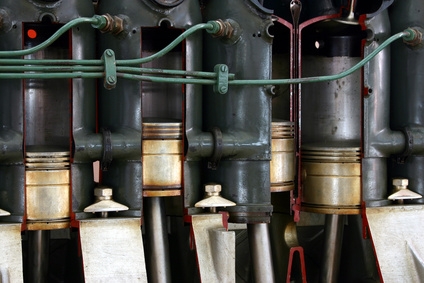
If anything besides exhaust is coming out of your vehicle's exhaust pipe, it could be signs of trouble. In the case of oil in your exhaust, it is important that you address the problem immediately. Keep in mind that almost any sign of oils exiting from the exhaust system will require professional evaluation.
The PVC valve allows the ventilation of controlled amounts of internal engine gases into the combustion chambers, allowing them to be burned. When it becomes clogged, it can cause the engine to become internally pressurized, forcing oil past important seals and into the exhaust stream. This can be accompanied by bluish smoke, reduced fuel economy and oil-fouled spark plugs. You can easily address this problem with a simple replacement of the valve.
Valve guides are an internal part of the engine that help to control the flow of gases into and out of the engine. They are lubricated by engine oil and have seals around their shafts that can become worn, allowing engine oil to seep past them. When this happens, engine oil leaks past the worn valve and into the flow of exhaust gases from the engine, accumulating in the exhaust pipe. Usually, this problem will be accompanied by bluish smoke coming from the exhaust.
Head gaskets seal the "heads" of the engine to the block. They are part of the intake and exhaust system and seal the many fluid passages between the heads and block. When a head gasket fails, fluids can escape past the seal and into the exhaust stream. This problem is normally accompanied by overheating, reduced power, poor fuel economy and rough running.
Pistons are the part of the engine that harnesses the energy from fuel combustion. Ignition of the fuel mixture forces them up and down in their bores, providing energy to move the vehicle. They are sealed in their bores by piston rings around their circumference, which are lubricated by engine oil. When these rings become worn, oil and fuel can leak past them into the exhaust system. This problem will be accompanied by white to bluish smoke and a noticeable loss of engine power.
Pistons directly harness the energy from combustion. A piston that develops a hole in its surface allows gases and oil to escape past it into the exhaust. This problem is usually accompanied by smoke, poor running, poor performance and engine noise.
An engine block is the block that houses all the internal parts of the engine and is full of passages that control the flow of fluids to its various working parts. A crack in the engine block allows oil to escape into the exhaust in a wide variety of ways and is always a serious problem. This problem will usually be accompanied by overheating, loss of power, rough running and engine noise.